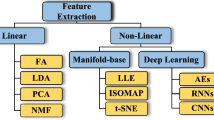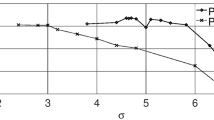Abstract
In order to overcome the shortcomings of the current English network learning system, based on the neural network algorithm, this paper constructs an intelligent English network learning system based on the improved algorithm. Moreover, by analyzing the coupling between recurrent neural networks by contrast methods, this paper infers the coupling between recurrent neural networks. Moreover, this paper studies the continuous attractors of the autoencoder neural network and studies the continuous attractors of different types of autoencoder models. On this basis, this paper expands the existing model, adds the module of the interaction between the external input and the visible layer and studies the conditions required for the continuous attractor of the autoencoder model. In addition, on the basis of actual needs, this paper constructs the basic structure of the model and integrates it into the improved algorithm proposed in this paper to realize English online intelligent learning. Finally, this paper designs experiments to analyze the practical effects of this model and analyzes the experimental results through mathematical statistics. The research results show that the English network learning system constructed in this paper is effective.















Similar content being viewed by others
References
Babu Premesh (2015) Developing Open and Distance Learning Programme in Labour and Development: Results of a Needs Assessment Study. Journal of natural history. 196(29):265–291
Brkovic M, Chiles P (2016) ‘Spector - the sustainability inspector’: Participatory teaching, learning and evaluation game for architects, architecture students and pupils[J]. Facta Universitatis 14(1):1–20
Delgaty L (2015) Twelve tips for academic role and institutional change in distance learning[J]. Med Teach 37(1):41–46
Dong H, Gong S, Liu C et al (2017) Large margin relative distance learning for person re-identification[J]. IET Comput Vision 11(6):455–462
Eckler U, Greisberger A, Höhne Franziska et al (2017) Blended learning versus traditional teaching-learning-setting: Evaluation of cognitive and affective learning outcomes for the inter-professional field of occupational medicine and prevention / Blended Learning versus traditionelles Lehr-Lernsetting: Evaluierung von kognitiven und affektiven Lernergebnissen für das interprofessionelle Arbeitsfeld Arbeitsmedizin und Prävention[J]. Nephron Clinical Practice. 4(2):109–121
Garofalo F, Mota-Moya P, Munday A et al (2017) Total Extraperitoneal Hernia Repair: Residency Teaching Program and Outcome Evaluation. World journal of surgery. 41(1):1–6
Hsu CC, Kung CH, Jheng JJ et al (2019) Unsupervised distance learning for extended self-organizing map and visualization of mixed-type data[J]. Intelligent Data Analysis 23(4):799–823
Jiang Y, Wang Y (2016) Evaluation of Teaching Quality of Public Physical Education in Colleges Based on the Fuzzy Evaluation Theory[J]. Journal of Computational and Theoretical Nanoence 13(12):9848–9851
Li A, Li K, Ge Z (2015) Application of Data Mining in the Colleges’ in-Class Teaching Quality Evaluation System[J]. Journal of Computers 10(3):166–175
Linhares RN, Alcântara Caio Mário Guimarães, Gonçalves Everton Ávila et al (2017) Teaching Evaluation by Teachers from Brazil and Portugal: A Comparative Analysis[J]. American Journal of Educational Research. 5(5):546–551
Liu S, Chen P (2015) Research on Fuzzy Comprehensive Evaluation in Practice Teaching Assessment of Computer Majors[J]. International Journal of Modern Education & Computer Science 7(11):12–19
Luo Y, Wen Y, Liu T et al (2019) Transferring Knowledge Fragments for Learning Distance Metric from a Heterogeneous Domain[J]. IEEE Trans Pattern Anal Mach Intell 41(4):1013–1026
Cerón Manuel Sánchez, María Francisca, del Sagrario Corte Cruz (2015) The Evaluation of Teaching: Some Consequences for Latin America[J]. Revista Mexicana De Investigacion Educativa. 20(67):1233–1253
Oliveros María Amparo, García Alejandra, Valdez Benjamín (2015) Evaluation of a Teaching Sequence Regarding Science, Technology and Society Values in Higher Education[J]. Creative Education. 6(16):1768–1775
Tran ND (2015) Reconceptualisation of approaches to teaching evaluation in higher education[J]. Issues in educational research. 25(1):50–61
Huang N (2017) Analysis and Design of University Teaching Evaluation System Based on JSP Platform[J]. International Journal of Education & Management Engineering 7(3):43–50
Porozovs J, Liepniece L, Voita D (2015) Evaluation of the Teaching Methods Used in Secondary School Biology Lessons[J]. Nephron Clin Pract 7(1):60–66
Qian Q, Jin R, Yi J et al (2015) Efficient distance metric learning by adaptive sampling and mini-batch stochastic gradient descent (SGD)[J]. Machine Learning 99(3):353–372
Reisenwitz Timothy H (2015) Student evaluation of teaching: an investigation of nonresponse bias in an online context[J]. Journal of marketing education. 38(4):139–144
Royal K (2016) A Guide for Making Valid Interpretations of Student Evaluation of Teaching (SET) Results[J]. J Vet Med Educ 44(2):1–7
Stefanovic M, Tadic D, Nestic S et al (2015) An Assessment of Distance Learning Laboratory Objectives for Control Engineering Education[J]. Comput Appl Eng Educ 23(2):191–202
Wu P, Low SP, Liu JY et al (2015) Critical Success Factors in Distance Learning Construction Programs at Central Queensland University: Students’ Perspective[J]. Journal of Professional Issues in Engineering Education and Practice 141(1):05014003
Ye HJ, Zhan DC, Jiang Y (2019) Fast generalization rates for distance metric learning: Improved theoretical analysis for smooth strongly convex distance metric learning[J]. Machine Learning 108(2):267–295
Zhao H (2015) College Physics Teaching Model Design and Evaluation Research ofStudents’ Seriousness[J]. Open Cybernetics & Systemics Journal 9(1):2017–2020
Zhou L, Li H, Sun K (2016) Teaching performance evaluation by means of a hierarchical multifactorial evaluation model based on type-2 fuzzy sets[J]. Appl Intell 46(1):1–11
Acknowledgements
The study was supported by “Industry-University Cooperative Education Project” from the Ministry of Education, China (Assessment on user experience of intelligent cloud products oriented to College English course, Grant No. 201902031009)” and Guangdong Planning Office of Philosophy and Social Science (Grant No. GD20WZX02-01).
Author information
Authors and Affiliations
Corresponding author
Ethics declarations
Conflict of interest
The authors declared that they have no conflicts of interest to this work. We declare that we do not have any commercial or associative interest that represents a conflict of interest in connection with the work submitted.
Additional information
Publisher's Note
Springer Nature remains neutral with regard to jurisdictional claims in published maps and institutional affiliations.
Rights and permissions
About this article
Cite this article
Peng, N. Research on the effectiveness of English online learning based on neural network. Neural Comput & Applic 34, 2543–2554 (2022). https://doi.org/10.1007/s00521-021-05855-5
Received:
Accepted:
Published:
Issue Date:
DOI: https://doi.org/10.1007/s00521-021-05855-5




